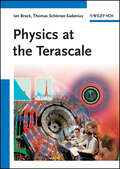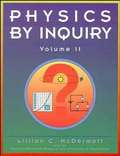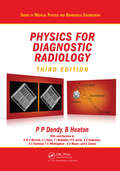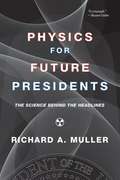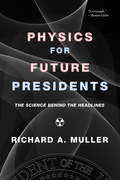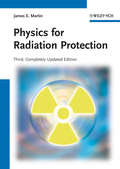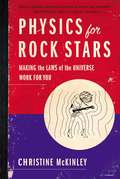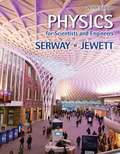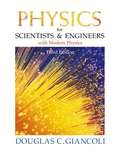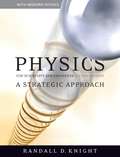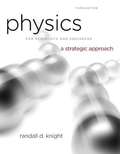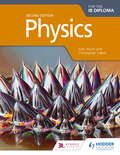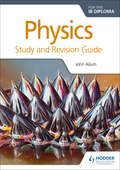- Table View
- List View
Physics at the Biomolecular Interface
by Ariel FernándezThis bookfocuses primarily on the role of interfacial forces in understanding biologicalphenomena at the molecular scale. By providing a suitable statisticalmechanical apparatus to handle the biomolecular interface, the book becomesuniquely positioned to address core problems in molecular biophysics. Ithighlights the importance of interfacial tension in delineating a solution tothe protein folding problem, in unravelling the physico-chemical basis ofenzyme catalysis and protein associations, and in rationally designingmolecular targeted therapies. Thus grounded in fundamental science, the bookdevelops a powerful technological platform for drug discovery, while it is setto inspire scientists at any level in their careers determined to address themajor challenges in molecular biophysics. Theacknowledgment of how exquisitely the structure and dynamics of proteins and theiraqueous environment are related attests to the overdue recognition thatbiomolecular phenomena cannot be effectively understood without dealing withinterfacial behaviour. There is an urge to grasp how biologically relevantbehaviour is shaped by the structuring of biomolecular interfaces and howinterfacial tension affects the molecular events that take place in the cell. This book squarely addresses these needs from a physicist perspective. Thebook may serve as a monograph for practitioners and, alternatively, as anadvanced textbook. Fruitful reading requires a background in physical chemistryand some basics in biophysics. The selected problems at the end of the chaptersand the progression in conceptual difficulty make it a suitable textbook for agraduate level course or an elective course for seniors majoring in chemistry,physics, biomedical engineering or related disciplines.
Physics at the Terascale
by Thomas Schörner-Sadenius Ian BrockWritten by authors working at the forefront of research, this accessible treatment presents the current status of the field of collider-based particle physics at the highest energies available, as well as recent results and experimental techniques. It is clearly divided into three sections; The first covers the physics -- discussing the various aspects of the Standard Model as well as its extensions, explaining important experimental results and highlighting the expectations from the Large Hadron Collider (LHC). The second is dedicated to the involved technologies and detector concepts, and the third covers the important - but often neglected - topics of the organisation and financing of high-energy physics research. A useful resource for students and researchers from high-energy physics.
Physics by Example: 200 Problems and Solutions
by W. G. ReesPhysics by Example contains two hundred problems from a wide range of key topics, along with detailed, step-by-step solutions. By guiding the reader through carefully chosen examples, this book will help to develop skill in manipulating physical concepts. Topics dealt with include: statistical analysis, classical mechanics, gravitation and orbits, special relativity, basic quantum physics, oscillations and waves, optics, electromagnetism, electric circuits, and thermodynamics. There is also a section listing physical constants and other useful data, including a summary of some important mathematical results. In discussing the key factors and most suitable methods of approach for given problems, this book imparts many useful insights, and will be invaluable to anyone taking first or second year undergraduate courses in physics.
Physics by Inquiry: An Introduction to Physics and the Physical Sciences, Vol. 2
by Lillian C. Mcdermott Peter S. Shaffer Mark L. Rosenquist Physics Education Group University of WashingtonContains laboratory-based modules featuring narrative, experiments, exercises, and problems on electric circuits, electromagnets, optics, kinematics, and astronomy, offering an introduction to physics and the physical sciences through the study of simple physical systems and their interactions, and emphasizing the development of scientific reasoning. Volumes I and II will be followed by a third volume extending the approach to topics in the standard physics course.
Physics class 9 - MIE
by Mauritius Institute of EducationThe textbook offers a comprehensive overview of Grade 9 Physics from the Mauritius Institute of Education, specifically focusing on the Measurement in Science unit. It includes information on contributors involved in the textbook's creation and review, curriculum alignment with national standards, and an emphasis on incremental content development and scientific skills from previous grades. Learning tools provided encompass inquiry-based activities, summaries, "Find out" features, "Did you know?" sections, project work suggestions, unit summaries, and concept maps for effective learning and assessment. The unit itself covers the measurement of physical quantities such as length, volume, mass, time, and temperature, offering detailed explanations, error avoidance techniques, and practical activities to aid comprehension.
Physics for Anesthesiologists and Intensivists: From Daily Life to Clinical Practice
by Antonio PisanoThis book, now in its 2nd edition, discusses, explains and provides detailed, up-to-date information on physics applied to clinical practice in anesthesiology and critical care medicine, with the aid of simple examples from daily life. Almost everything that happens around us, including in the operating room and intensive care units, can be explained by physical laws. An awareness and understanding of relatively simple laws such as the Hagen-Poiseuille equation, or of slightly more complex topics such as harmonic motion and electromagnetism, to name just a few, offer anesthesiologists and intensivists fascinating insights into why they do what they do.After an introductory chapter that brushes up on all the (few) mathematics the reader will need to face the book, with many practical examples and clinical applications, each of the following 20 chapters deals with some everyday phenomena, explains them with one or more physical laws, and shows why these laws are important in anesthesia and critical care practice. Many illustrations are included for extra clarity. This enriched and updated edition of Physics for Anesthesiologists is intended for anesthesiologists, intensivists, anesthesia and intensive care medicine teachers and trainees, as well as medical students.
Physics for Diagnostic Radiology (Series in Medical Physics and Biomedical Engineering)
by Philip Palin Dendy Brian HeatonWith every chapter revised and updated, Physics for Diagnostic Radiology, Third Edition continues to emphasise the importance of physics education as a critical component of radiology training. This bestselling text helps readers understand how various imaging techniques work, from planar analogue and digital radiology to computed tomography (CT),
Physics for Dogs: A Crash Course in Catching Cats, Frisbees, and Cars
by John-Andrew Sandbrook Pepper Sandbrook-FlynnOld dogs may have trouble with new tricks, but now canine brainiacs can use the laws of physics to master their corner of the universe. Complete with technical illustrations, graphs, and formulas, this book shows dogs how to:Bring down the mailman with the correct ratio of stealth and brute forcePoop strategically-indoors and out-by understanding variable-mass systemsOpen any cupboard with Newton's First LawPlay fetch by calculating velocity and maximum rangeCatch squirrels by accounting for friction, weight, and air resistanceAnd much, much more! With this hilariously prescriptive how-to, pooches of every size and temperament will learn to chase cars-and catch them!
Physics for Future Presidents: The Science Behind The Headlines
by Richard A. MullerLearn the science behind the headlines-the tools of terrorists, the dangers of nuclear power, and the reality of global warming.<P><P> We live in complicated, dangerous times. They are also hyper-technical times. As citizens who will elect future presidents of the most powerful and influential country in the world, we need to know-truly understand, not just rely on television's talking heads-if Iran's nascent nuclear capability is a genuine threat to the West, if biochemical weapons are likely to be developed by terrorists, if there are viable alternatives to fossil fuels that should be nurtured and supported by the government, if nuclear power should be encouraged, and if global warming is actually happening. This book is written in everyday, nontechnical language on the science behind the concerns that our nation faces in the immediate future. Even active readers of serious journalism will be surprised by the lessons that the book contains. It is "must-have" information for all presidents-and citizens-of the twenty-first century. <P> Winner of the 2009 Northern California Book Award for General Nonfiction.<P> Note: There is a publisher quality version of this book at https://www.bookshare.org/browse/book/1055976/ that includes the images for some of the figures in the book. Because of electronic rights issues however, not all of the figures are in that book and the captions for the missing figures are left out as well. All captions are available in this scanned version.
Physics for Future Presidents: The Science Behind The Headlines
by Richard A. Muller"A must-read for future presidents." --?New Scientist? We live in complicated, dangerous times. Barack Obama and his successors will need to know if Iran's nascent nuclear capability is a genuine threat to the West, if biochemical weapons are likely to be developed by terrorists, if there are viable alternatives to fossil fuels that should be nurtured and supported by the government, if nuclear power should be encouraged, and what is the real truth about global warming. This is "must-have" information for all presidents--and citizens--of the twenty-first century. Winner of the 2009 Northern California Book Award for General Nonfiction.
Physics for Particle Detectors and Particle Detectors for Physics: Timing Performance of Semiconductor Detectors with Internal Gain and Constraints on High-Scale Interactions of the Higgs Boson (Springer Theses)
by Philipp WindischhoferExperimental particle physics is a science of many scales. A large number of physical processes spanning energies from meV to TeV must be understood for modern collider experiments to be designed, built, and conducted successfully. This thesis contributes to the understanding of phenomena across this entire dynamic range. The first half of this document studies aspects of low-energy physics that govern the operation of particle detectors, limit their performance, and guide the development of novel instrumentation. To formalise these aspects, classical electrodynamics is used to derive a general description of the formation of electrical signals in detectors, and ideas from quantum mechanics are applied to the study of charge avalanche amplification in semiconductors. These results lead to a comprehensive analytical characterisation of the time resolution and the efficiency of single-photon avalanche diodes, and isolate the most important design variables. They also reveal the applicability of these devices in precision timing detectors for charged particles, which is experimentally verified in a high-energy hadron beam. Large detector systems at hadron colliders probe fundamental physics at the energy frontier. In the second half, data collected with the ATLAS detector during Run 2 of the Large Hadron Collider are used to measure the cross-section for the production of a Higgs boson together with an electroweak boson as a function of the kinematic scale of the process. This measurement provides the finest granularity available to date for this process. It is highly informative of the structure of interactions beyond the direct kinematic reach of the experiment, and new limits are set on the couplings of such interactions within an effective field theory.
Physics for Radiation Protection
by James E. MartinA practical guide to the basic physics that radiation protection professionals needA much-needed working resource for health physicists and other radiation protection professionals, this volume presents clear, thorough, up-to-date explanations of the basic physics necessary to address real-world problems in radiation protection. Designed for readers with limited as well as basic science backgrounds, Physics for Radiation Protection emphasizes applied concepts and carefully illustrates all topics through examples as well as practice problems.Physics for Radiation Protection draws substantially on current resource data available for health physics use, providing decay schemes and emission energies for approximately 100 of the most common radionuclides encountered by practitioners. Excerpts of the Chart of the Nuclides, activation cross sections, fission yields, fission-product chains, photon attenuation coefficients, and nuclear masses are also provided. Coverage includes:The atom as an energy systemAn overview of the major discoveries in radiation physicsExtensive discussion of radioactivity, including sources and materialsNuclear interactions and processes of radiation doseCalculational methods for radiation exposure, dose, and shieldingNuclear fission and production of activation and fission productsSpecialty topics ranging from nuclear criticality and applied statistics to X raysExtensive and current resource data cross-referenced to standard compendiumsExtensive appendices and more than 400 figuresThis complete discussion of the basic concepts allows readers to advance their professional skills.
Physics for Rock Stars
by Christine MckinleyFrom the host of the History channel's Brad Meltzer's Decoded: the laws of the universe like you've never experienced them before. This approachable book explains the world of physics with clarity, humor, and a dash of adventure. Physics for Rock Stars is not a weighty treatise on science, but a personal tour of physics from a quirky friend. Anyone who's ever wondered why nature abhors a vacuum, what causes magnetic attraction, or how to jump off a moving train or do a perfect stage dive will find answers and a few laughs too. No equations, numbers, or tricky concepts--just an inspiring and comical romp through the basics of physics and the beauty of the organized universe.
Physics for Scientists and Engineers
by Raymond Serway John JewettAs a market leader, PHYSICS FOR SCIENTISTS AND ENGINEERS is one of the most powerful brands in the physics market. While preserving concise language, state-of-the-art educational pedagogy, and top-notch worked examples, the Ninth Edition highlights the Analysis Model approach to problem-solving, including brand-new Analysis Model Tutorials, written by text co-author John Jewett, and available in Enhanced WebAssign. The Analysis Model approach lays out a standard set of situations that appear in most physics problems, and serves as a bridge to help students identify the correct fundamental principle--and then the equation--to utilize in solving that problem. The unified art program and the carefully thought out problem sets also enhance the thoughtful instruction for which Raymond A. Serway and John W. Jewett, Jr. earned their reputations. The Ninth Edition of PHYSICS FOR SCIENTISTS AND ENGINEERS continues to be accompanied by Enhanced WebAssign in the most integrated text-technology offering available today.
Physics for Scientists and Engineers
by Raymond A. Serway John W. Jewett Jr. Vahe PeroomianNIMAC-sourced textbook
Physics for Scientists and Engineers (6th Edition)
by Paul A. Tipler Gene MoscaThe Sixth Edition of Physics for Scientists and Engineers offers a completely integrated text and media solution that will help students learn most effectively and will enable professors to customize their classrooms so that they teach most efficiently. The text includes a new strategic problem-solving approach, an integrated Math Tutorial, and new tools to improve conceptual understanding.
Physics for Scientists and Engineers [Standard Version]
by Paul A. Tipler Gene MoscaThe Sixth Edition ofPhysics for Scientists and Engineersoffers a completely integrated text and media solution that will help students learn most effectively and will enable professors to customize their classrooms so that they teach most efficiently. The text includes a new strategic problem-solving approach, an integrated Math Tutorial, and new tools to improve conceptual understanding. To simplify the review and use of the text,Physics for Scientists and Engineersis available in these versions: Volume 1Mechanics/Oscillations and Waves/Thermodynamics(Chapters 1-20, R) 1-4292-0132-0 Volume 2Electricity and Magnetism/Light(Chapters 21-33) 1-4292-0133-9 Volume 3Elementary Modern Physics(Chapters 34-41) 1-4292-0134-7 Standard Version(Chapters 1-33, R) 1-4292-0124-X Extended Version(Chapters 1-41, R) 0-7167-8964-7
Physics for Scientists and Engineers with Modern Physics, 3rd edition
by Prentice-Hall Staff Douglas C. GiancoliPhysics for Scientists and Engineers combines outstanding pedagogy with a clear and direct narrative and applications that draw the reader into the physics. The new edition features an unrivaled suite of media and on-line resources that enhance the understanding of physics. Many new topics have been incorporated such as: the Otto cycle, lens combinations, three-phase alternating current, and many more. New developments and discoveries in physics have been added including the Hubble space telescope, age and inflation of the universe, and distant planets. Modern physics topics are often discussed within the framework of classical physics where appropriate. For scientists and engineers who are interested in learning physics.
Physics for Scientists and Engineers: A Strategic Approach with Modern Physics (Second Edition)
by Randall D. KnightIn this edition, Knight builds on the research-proven instructional techniques he introduced, as well as national data of student performance, to take student learning even further. Knight’s insight into student learning difficulties, and skillful crafting of text and figures at every level results in an effective and accessible book, leading students to a deeper and better-connected understanding of the concepts and more proficient problem-solving skills. Building on an NSF-sponsored educational research program and input from tens of thousands of student users, the second edition refines and extends the pedagogical innovations that years of use has now shown to be effective.
Physics for Scientists and Engineers: A Strategic Approach, Vol. 1, Chs 1-15 (3rd Edition)
by Randall D. KnightAs the most widely adopted new physics book in more than 50 years, Knight's Physics for Scientists and Engineers was published to widespread critical acclaim from professors and students. In the Third Edition,Knight builds on the research-proven instructional techniques he introduced in the first and second editions, as well as national data of student performance, to take student learning even further. Knight's unparalleled insight into student learning difficulties, and his impeccably skillful crafting of text and figures at every level-from macro to micro-to address these difficulties, results in a uniquely effective and accessible book, leading students to a deeper and better-connected understanding of the concepts and more proficient problem-solving skills. For the Third Edition, Knight continues to apply the best results from educational research, and to refine and tailor them for this course and its students. New pedagogical features (Chapter Previews, Challenge Examples, and Data-based Examples), end-of-chapter problem sets enhanced through analysis of national student metadata, and fine-tuned and streamlined content take the hallmarks of the previous editions-exceptionally effective conceptual explanation and problem-solving instruction-to a new level. This package contains: Physics for Scientists and Engineers: A Strategic Approach, Volume 1 (Chs 1-15), Third Edition.
Physics for Scientists and Engineers: Non-info Trac Version
by Raymond A. Serway John W. Jewett Jr.NIMAC-sourced textbook
Physics for the Anaesthetic Viva
by Kalsi, Aman and Balani, Nikhail Aman Kalsi Nikhail BalaniPhysics for the Anaesthetic Viva is a succinct and practical text that comprehensively covers all aspects of the physics and clinical measurement curriculum for the FRCA examinations. Each section begins by explaining the basic science concepts, which are then expanded and related to everyday practice. Illustrations are used to enhance understanding of the concepts, and are presented in such a way as to be easy to reproduce in the exam setting. In addition, sample viva questions are provided at the end of each chapter to test learning, or for use in a mock viva session. Written by trainees for trainees, this book provides exactly what you need to pass the exam.
Physics for the IB Diploma Second Edition
by Christopher Talbot John AllumProvide clear guidance to the 2014 changes and ensure in-depth study with accessible content, directly mapped to the new syllabus and approach to learning.This bestselling textbook contains all SL and HL content, which is clearly identified throughout. Options are available free online, along with appendices and data and statistics.- Improve exam performance, with exam-style questions, including from past papers- Integrate Theory of Knowledge into your lessons and provide opportunities for cross-curriculum study- Stretch more able students with extension activities- The shift to concept-based approach to learning , Nature of Science, is covered by providing a framework for the course with points for discussion - Key skills and experiments included - Full digital package - offered in a variety of formats so that you can deliver the course just how you like!
Physics for the IB Diploma Second Edition
by John AllumProvide clear guidance to the 2014 changes and ensure in-depth study with accessible content, directly mapped to the new syllabus and approach to learning.This bestselling textbook contains all SL and HL content, which is clearly identified throughout. Options are available free online, along with appendices and data and statistics.- Improve exam performance, with exam-style questions, including from past papers- Integrate Theory of Knowledge into your lessons and provide opportunities for cross-curriculum study- Stretch more able students with extension activities- The shift to concept-based approach to learning , Nature of Science, is covered by providing a framework for the course with points for discussion - Key skills and experiments included - Full digital package - offered in a variety of formats so that you can deliver the course just how you like!
Physics for the IB Diploma Study and Revision Guide
by John AllumStretch your students to achieve their best grade with these year round course companions; providing clear and concise explanations of all syllabus requirements and topics, and practice questions to support and strengthen learning. - Consolidate revision and support learning with a range of exam practice questions and concise and accessible revision notes- Practise exam technique with tips and trusted guidance from examiners on how to tackle questions- Focus revision with key terms and definitions listed for each topic/sub topic

